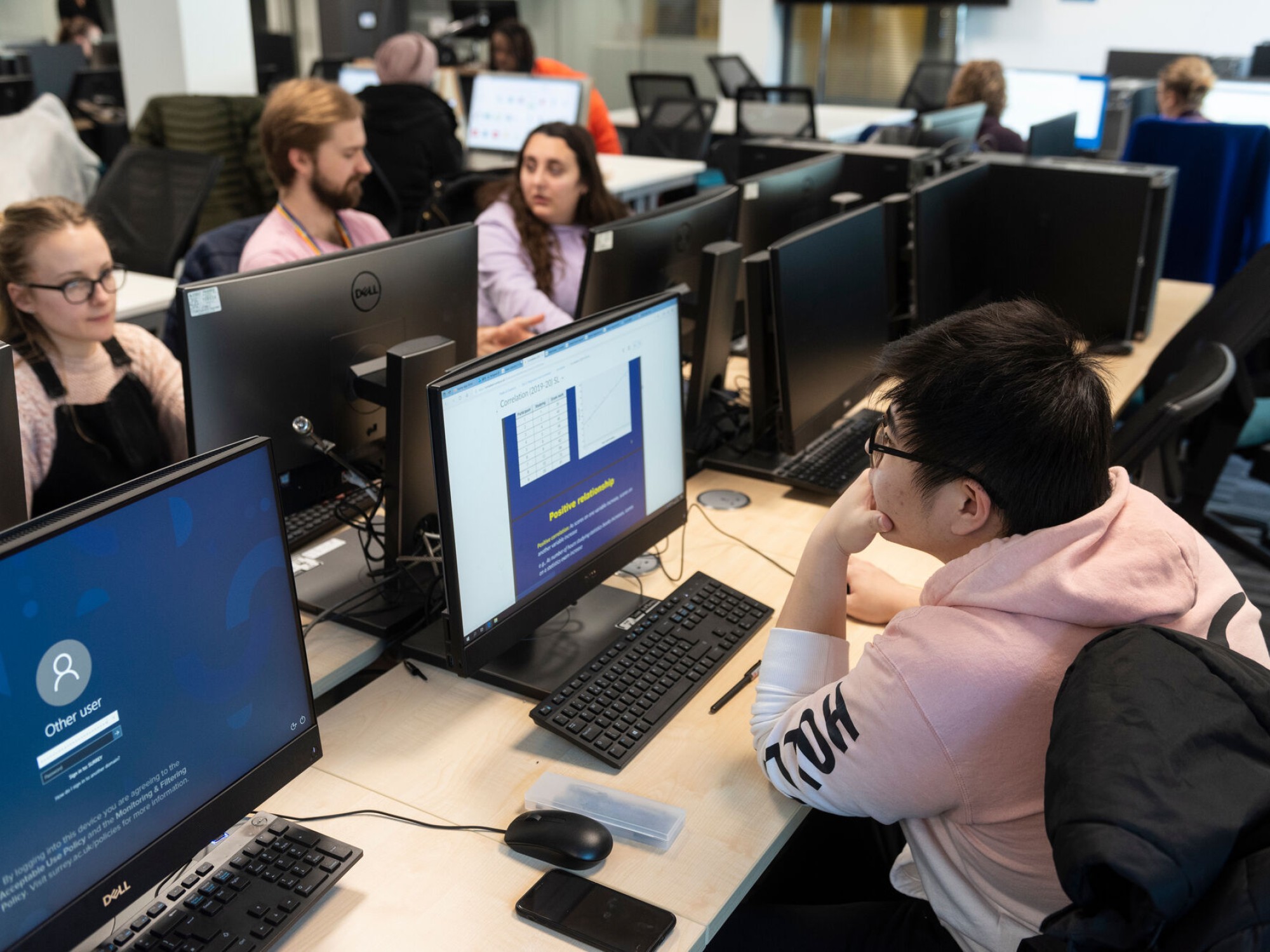
- Economics
MSc — 2025 entry Economics
This masters programme is designed to prepare you for a range of careers in which advanced economics analysis and independent thought can contribute to fulfilling your professional ambitions.
Why choose
this course?
- Economics helps us decipher and shape our complex world. It offers unparalleled insights into how decisions by individuals, businesses, and the government affect important aspects of everyone’s life, including employment opportunities, the prices of products and services, and the overall standards of living.
- Our MSc in Economics will help you build on your undergraduate studies to develop advanced capabilities in the discipline, and you will benefit from a boost in skills that are relevant to the modern world.
- In the 2021 Research Excellence Framework, Economics was ranked in the top 10 in the UK for world-leading research and achieved an overall ranking of 6th for real-world impact and 8th for research environment.
Statistics
Top 10 in UK
In the 2021 Research Excellence Framework (REF), Economics was ranked in the top 10 in the UK for world-leading research
6th for real-world impact
Economics achieved an overall ranking of 6th for real-world impact and 8th for research environment in REF 2021.
11th in the UK
For economics and econometrics in the Times Higher Education World Subject Rankings 2024
Accreditation

What you will study
Our Economics MSc comprehensively covers the core areas of microeconomics, macroeconomics, and econometrics in which you will develop a systematic understanding to position yourself at the forefront of the discipline.
As well as acquiring outstanding theoretical knowledge, you'll also learn how to solve problems and bring your analytical strengths to bear on applied issues.
The MSc in Economics features a series of lectures and workshops in research methods that will allow you to build the skills you need to carry out independent research in economics and complete your dissertation in the summer.
We offer a range of elective modules which will allow you to tailor your course to meet your needs and interests. These modules reflect the full range of academic expertise and active research interests of members of staff.
In the second semester students can opt into the following pathway:
Or stay the course and choose among modules such as Advanced Macroeconomics, Financial Econometrics and International Finance.
Professional recognition
MSc - Chartered Institute of Management Accountants (CIMA)
Accredited by the Chartered Institute of Management Accountants (CIMA) for the purpose of exemption from some professional examinations through the Accredited degree accelerated route.
Facilities
The University provides our students with leading facilities, including our recently renovated Library and Learning Centre and a range of computer labs across campus.
For students on this course, a designated computer lab is available. You will have access to specialist software and have the chance to work and learn together with your peers in a vibrant research-focused environment.
The structure of our programmes follows clear educational aims that are tailored to each programme. These are all outlined in the programme specifications which include further details such as the learning outcomes:
Modules
Modules listed are indicative, reflecting the information available at the time of publication. Modules are subject to teaching availability, student demand and/or class size caps.
The University operates a credit framework for all taught programmes based on a 15-credit tariff, meaning all modules are comprised of multiples of 15 credits, up to a maximum of 120 credits.
Course options
Year 1
Semester 1
Compulsory
This module provides an in-depth introduction to the building blocks of graduate-level microeconomics. It introduces students to the modelling of economic behavior under certainty and uncertainty and the interplay among economic agents in markets.
View full module detailsThis module provides an in-depth review of the building blocks of macroeconomic theories and introduces macroeconomic datasets at the graduate level.
View full module detailsThe first part of the module is designed to provide the necessary foundation in mathematical and statistical techniques for the study of economics at graduate level. The second part provides an introduction to programming using specialist programming software. Students will learn how to use numerical methods in the context of mathematic optimisation and data analysis.
View full module detailsThis module is an introduction to the methods of specification, estimation and testing of econometric models in a general multivariate setting. The techniques are applied to real data making use of the econometric packages.
View full module detailsSemester 2
Compulsory
This module introduces students to microeconometric techniques relevant for the estimation of a range of models including those with either qualitative or limited dependent variables, models for survival analysis,panel data models programme evaluation and decomposition techniques, and regression discontinuity design. A strong emphasis is placed on the empirical applications of these techniques and their intuition.
View full module detailsThis module builds on the techniques for dynamic optimization developed in ECOM021 and taken together, the two courses provide a rigorous introduction to modern macroeconomic modelling. ECOM047 focuses on model construction, simulation and policy analysis. The general approach to macro-economic modelling is to derive all decisions of economic agents from micro-foundations in a rational expectations, dynamic and stochastic setting. Taken together with market clearing, the models studied are then the dynamic general equilibrium (GE) model that forms the basis of macroeconomic modelling that is common nowadays. The Course will study the construction of a rich, modern macroeconomic model in steps, progressing in stages from simpler set-ups. The use of Software packages Matlab will be taught to carry out the numerical solution and simulation of the models. The ultimate aim is to use such models to first, understand the movements in macroeconomic data and second, understand their implications for policies.
View full module detailsPerhaps the most significant development in microeconomics in the last forty years has been the attempt to deal with market failures caused by asymmetric information and strategic behaviour. The importance of these developments is apparent from the Nobel prizes that have been awarded to game theorists and information economists. This module is designed to cover the central topics related to markets and interactions with asymmetric information. Studying this module will help you to apply and extend your knowledge of microeconomic theory. You will learn about the effects of asymmetric information and strategic behaviour on the outcomes of market interactions.
View full module detailsOptional
This module looks at the firm and the industrial environment in which it operates. It asks why the firm exists and how it chooses to organise itself, before considering some of the factors that affect its performance and how these are related to the market structure in which it operates. An important influence on the firm is the structure of the market in which the firm works. This will affect the products and the process that the firm selects and the profits it earns. At the same time, of course, the firm may take actions that affect this market structure to its advantage. Thus, we want to ask how the firm¿s performance is affected by the market it is in. This has important competition and industrial policy implications.
View full module detailsThe course is mainly aimed at reviewing modern theories of international finance, with special reference to developing economies. This module starts with micro foundation of macroeconomics, that is, intertemporal optimization. Then it exposes students fundamental topics of international finances such as risk sharing, exchange rate, and currency crises. It also emphasizes the importance of empirical analysis with recent econometric methods.
View full module detailsThe module examines theories of international trade as well as selected empirical evidence relating to these theories.
View full module detailsThis module provides an in-depth review of the building blocks of finance theory and introduces the workings of the capital, financial options, and foreign exchange markets at the graduate level. It encompasses investor behaviour, asset pricing and financial trading.
View full module detailsThe first part of this module draws a big picture of the banking systems and introduces how central banks interact with financial markets. More precisely, we cover topics on central banking, monetary policies, and international banking. The second part of this module is more research oriented and focuses on several fundamental topics on central banking and financial markets.
View full module detailsSemester 1 & 2
Compulsory
This module provides an overview of research methods employed in economics, laying the foundations for the dissertation, and guides students on how to carry out independent research.
View full module detailsOptional modules for Year 1 (full-time) - FHEQ Level 7
In Semester 2, students must choose one optional module.
Year 1
Semester 1
Compulsory
This module provides an in-depth introduction to the building blocks of graduate-level microeconomics. It introduces students to the modelling of economic behavior under certainty and uncertainty and the interplay among economic agents in markets.
View full module detailsThe first part of the module is designed to provide the necessary foundation in mathematical and statistical techniques for the study of economics at graduate level. The second part provides an introduction to programming using specialist programming software. Students will learn how to use numerical methods in the context of mathematic optimisation and data analysis.
View full module detailsSemester 2
Compulsory
Perhaps the most significant development in microeconomics in the last forty years has been the attempt to deal with market failures caused by asymmetric information and strategic behaviour. The importance of these developments is apparent from the Nobel prizes that have been awarded to game theorists and information economists. This module is designed to cover the central topics related to markets and interactions with asymmetric information. Studying this module will help you to apply and extend your knowledge of microeconomic theory. You will learn about the effects of asymmetric information and strategic behaviour on the outcomes of market interactions.
View full module detailsOptional
This module looks at the firm and the industrial environment in which it operates. It asks why the firm exists and how it chooses to organise itself, before considering some of the factors that affect its performance and how these are related to the market structure in which it operates. An important influence on the firm is the structure of the market in which the firm works. This will affect the products and the process that the firm selects and the profits it earns. At the same time, of course, the firm may take actions that affect this market structure to its advantage. Thus, we want to ask how the firm¿s performance is affected by the market it is in. This has important competition and industrial policy implications.
View full module detailsThe course is mainly aimed at reviewing modern theories of international finance, with special reference to developing economies. This module starts with micro foundation of macroeconomics, that is, intertemporal optimization. Then it exposes students fundamental topics of international finances such as risk sharing, exchange rate, and currency crises. It also emphasizes the importance of empirical analysis with recent econometric methods.
View full module detailsThe module examines theories of international trade as well as selected empirical evidence relating to these theories.
View full module detailsThis module provides an in-depth review of the building blocks of finance theory and introduces the workings of the capital, financial options, and foreign exchange markets at the graduate level. It encompasses investor behaviour, asset pricing and financial trading.
View full module detailsThe first part of this module draws a big picture of the banking systems and introduces how central banks interact with financial markets. More precisely, we cover topics on central banking, monetary policies, and international banking. The second part of this module is more research oriented and focuses on several fundamental topics on central banking and financial markets.
View full module detailsOptional modules for Year 1 (part-time) - FHEQ Level 7
In Semester 2, students must choose one optional module.
Year 2
Semester 1
Compulsory
This module provides an in-depth review of the building blocks of macroeconomic theories and introduces macroeconomic datasets at the graduate level.
View full module detailsThis module is an introduction to the methods of specification, estimation and testing of econometric models in a general multivariate setting. The techniques are applied to real data making use of the econometric packages.
View full module detailsSemester 2
Compulsory
This module builds on the techniques for dynamic optimization developed in ECOM021 and taken together, the two courses provide a rigorous introduction to modern macroeconomic modelling. ECOM047 focuses on model construction, simulation and policy analysis. The general approach to macro-economic modelling is to derive all decisions of economic agents from micro-foundations in a rational expectations, dynamic and stochastic setting. Taken together with market clearing, the models studied are then the dynamic general equilibrium (GE) model that forms the basis of macroeconomic modelling that is common nowadays. The Course will study the construction of a rich, modern macroeconomic model in steps, progressing in stages from simpler set-ups. The use of Software packages Matlab will be taught to carry out the numerical solution and simulation of the models. The ultimate aim is to use such models to first, understand the movements in macroeconomic data and second, understand their implications for policies.
View full module detailsThis module introduces students to microeconometric techniques relevant for the estimation of a range of models including those with either qualitative or limited dependent variables, models for survival analysis,panel data models programme evaluation and decomposition techniques, and regression discontinuity design. A strong emphasis is placed on the empirical applications of these techniques and their intuition.
View full module detailsSemester 1 & 2
Compulsory
This module provides an overview of research methods employed in economics, laying the foundations for the dissertation, and guides students on how to carry out independent research.
View full module detailsOptional modules for Year 2 (part-time) - FHEQ Level 7
In Semester 2, students have no optional module choice.
General course information
Contact hours
Contact hours can vary across our modules. Full details of the contact hours for each module are available from the University of Surrey's module catalogue. See the modules section for more information.
Timetable
Course timetables are normally available one month before the start of the semester.
New students will receive their personalised timetable in Welcome Week, and in subsequent semesters, two weeks prior to the start of semester.
Please note that while we make every effort to ensure that timetables are as student-friendly as possible, scheduled teaching can take place on any day of the week (Monday – Friday). Wednesday afternoons are normally reserved for sports and cultural activities. Part-time classes are normally scheduled on one or two days per week, details of which can be obtained from Academic Administration.
Location
This course is based at Stag Hill campus. Stag Hill is the University's main campus and where the majority of our courses are taught.
We offer careers information, advice and guidance to all students whilst studying with us, which is extended to our alumni for three years after leaving the University.
Some of our masters graduates have recently embarked on careers in roles such as:
- Economists
- Analysts (finance, business, data, trade, investment, and sales)
- Audit managers
- Consultants
- Economic advisors
- Regulatory advisors.
Others have gone on to study towards PhDs at Surrey and in other top schools.
UK qualifications
A minimum of a 2:1 UK honours degree in chemistry, computer science, economics, engineering, maths, physics, statistics.
Alternatively, another degree subject including 60 per cent (UK or equivalent) in macroeconomics and microeconomics and 60 per cent (UK or equivalent) in one module from algebra, calculus, maths, probability, quantitative methods or statistics.
Applicants not meeting the above requirements who hold a 2:2 in one of the relevant subjects with demonstrable exposure to sufficient mathematics, statistics or economics may still be considered.
English language requirements
IELTS Academic: 6.5 overall with 6.0 in each element.
These are the English language qualifications and levels that we can accept.
If you do not currently meet the level required for your programme, we offer intensive pre-sessional English language courses, designed to take you to the level of English ability and skill required for your studies here.
Recognition of prior learning
We recognise that many students enter their course with valuable knowledge and skills developed through a range of ways.
If this applies to you, the recognition of prior learning process may mean you can join a course without the formal entry requirements, or at a point appropriate to your previous learning and experience.
There are restrictions for some courses and fees may be payable for certain claims. Please contact the Admissions team with any queries.
Scholarships and bursaries
Discover what scholarships and bursaries are available to support your studies.
Fees per year
Explore UKCISA’s website for more information if you are unsure whether you are a UK or overseas student. View the list of fees for all postgraduate courses.
September 2025 - Full-time - 1 year
- UK
- £11,400
- Overseas
- £21,800
September 2025 - Part-time - 2 years
- UK
- £5,700
- Overseas
- £10,900
- If you are on the two-year part-time masters programme, the annual fee is payable in Year 1 and Year 2 of the programme
- These fees apply to students commencing study in the academic year 2025-26 only. Fees for new starters are reviewed annually.
Payment schedule
- Students with Tuition Fee Loan: the Student Loans Company pay fees in line with their schedule (students on an unstructured self-paced part-time course are not eligible for a Tuition Fee Loan).
- Students without a Tuition Fee Loan: pay their fees either in full at the beginning of the programme or in two instalments as follows:
- 50% payable 10 days after the invoice date (expected to be October/November of each academic year)
- 50% in January of the same academic year.
- Students on part-time programmes where fees are paid on a modular basis: cannot pay fees by instalment.
- Sponsored students: must provide us with valid sponsorship information that covers the period of study.
The exact date(s) will be on invoices.
Additional costs
Books/stationery/admin:
- £35/£75 - STATA software licence (6 or 12 months)
- £35 - Eviews student software licence (free lite version available).
Grand total: £70 - £110.
Funding
You may be able to borrow money to help pay your tuition fees and support you with your living costs. Find out more about postgraduate student finance.
Apply online
To apply online first select the course you'd like to apply for then log in.
Select your course
Choose the course option you wish to apply for.
Sign in
Create an account and sign into our application portal.
Please note that we may have to close applications before the stated deadline if we receive a high volume of suitable applications. We advise you to submit your application as soon as it is ready.
ApplyPlease note that we may have to close applications before the stated deadline if we receive a high volume of suitable applications. We advise you to submit your application as soon as it is ready.
ApplyAdmissions information
Once you apply, you can expect to hear back from us within 14 days. This might be with a decision on your application or with a request for further information.
Our code of practice for postgraduate admissions policy explains how the Admissions team considers applications and admits students. Read our postgraduate applicant guidance for more information on applying.
About the University of Surrey
Need more information?
Contact our Admissions team or talk to a current University of Surrey student online.
Terms and conditions
When you accept an offer to study at the University of Surrey, you are agreeing to follow our policies and procedures, student regulations, and terms and conditions.
We provide these terms and conditions in two stages:
- First when we make an offer.
- Second when students accept their offer and register to study with us (registration terms and conditions will vary depending on your course and academic year).
View our generic registration terms and conditions (PDF) for the 2024/25 academic year, as a guide on what to expect.
Disclaimer
This online prospectus has been published in advance of the academic year to which it applies.
Whilst we have done everything possible to ensure this information is accurate, some changes may happen between publishing and the start of the course.
It is important to check this website for any updates before you apply for a course with us. Read our full disclaimer.











